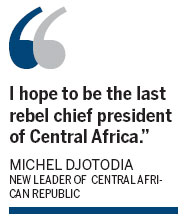Central African Republic rebels join the Cabinet

The prime minister of the Central African Republic has named mostly rebels and opposition figures to his new post-coup government, as reports emerged of child soldiers killed in the fight for the capital.
Prime Minister Nicolas Tiangaye - who has been allowed to retain his post by new leader Michel Djotodia, whose rebels seized the capital a week ago - named a 34-member cabinet on Sunday that includes nine ministers from the Seleka rebel coalition.
The new government, named in a decree read on national radio, also includes eight ministers from the former opposition and one close to ousted president Francois Bozize.
Djotodia, who named himself president after ousting Bozize on March 24, announced that he will act as defense minister, after the Seleka rebels seized control of the capital Bangui and Bozize fled to Cameroon on Sunday.
The petroleum, security, water and forestry, and communications ministries also went to Seleka members.
China urged all sides in the country to resolve the crisis through political means, Foreign Ministry spokesman Hong Lei said on Monday.
Peace urged
Hong said China has long kept an eye on the situation in the country and hopes all sides can effectively implement the Libreville Agreement, which stipulates the formation of a government of national unity to lead the transition for one year before the organization of legislative elections in 2014.
China urges all sides to take the interests of the country and people into account, restore order and safeguard social security as well as ethnic harmony, Hong said, adding that Beijing is willing to work with the international community to play a positive role in ensuring lasting peace and order in the African nation.
Djotodia's rebels launched a rapid-fire assault on Bangui last month to oust Bozize after the collapse of a January peace deal.
Rebel soldiers have largely secured the city with the aid of a regional African force. But troubling reports of child soldiers being killed in the battle for Bangui were published on Sunday in South Africa, which had sent troops to the Central African Republic in a failed effort to stabilize the country before Bozize's fall.
"It was only after the firing had stopped that we saw we had killed kids," a paratrooper who took part in the fighting told the Sunday Times."We did not come here for this ... to kill kids. It makes you sick. They were crying, calling for help ... calling for their moms."
The South African army declined to comment on the reports.
About 200 South African troops fought against some 3,000 rebels during the battle for Bangui, which lasted several hours.
In what has turned out to be South Africa's heaviest military loss since apartheid, 13 soldiers were killed in the fighting.
Seleka, a coalition of three rebel groups, launched its insurgency in December, accusing Bozize of failing to honor earlier peace deals signed with rebels in the conflict-prone country.
They quickly came within striking distance of Bangui, forcing Bozize into signing the January deal, which created a power-sharing government with Tiangaye as prime minister. But the rebels claimed Bozize was not respecting the deal, and renewed their assault.
The coup was welcomed by many in a city tired of Bozize's unfulfilled promises to rebuild the nation by harnessing its stores of oil, gold and uranium.
But fear quickly set in as swarms of armed men and gangs of looters roamed the capital after the coup.
Djotodia vowed on Saturday to hand over power at the end of a three-year transition period and not contest elections in 2016.
The latest in a long line of coup leaders, he said the rebels had come to power not through political ambition but through national duty.
"I hope to be the last rebel chief president of Central Africa," he told a crowd of supporters.
AFP-Xinhua
(China Daily 04/02/2013 page12)








